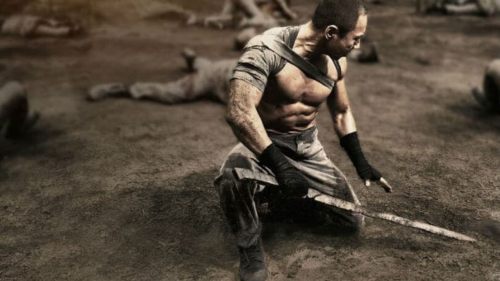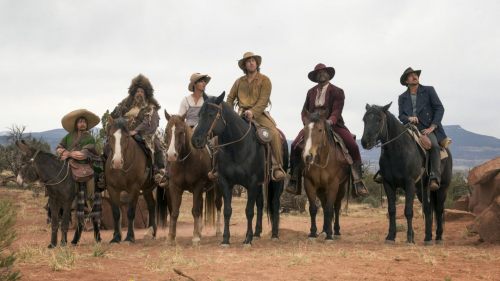BOJACK HORSEMAN Season Four Review – The Weight
It saddens me that in this day and age we are still trying to convince some that depression and mental health are serious issues. As many nobly sparred with the ill-informed opinions of dumb sportsmen on Twitter this past week over whether depression is, y’know, a thing, many others continue to face the unfortunate fact that the stigma of difference and of not being okay is still a very pervasive element in our society. Fortunately, it is in times of narrow-mindedness and general assholery that some of our best, most important art helps to normalise the other and make those suffering feel less alone. Where televisual depression has often been solely the realm of drama, personified by the Tony Sopranos and Don Drapers of prestige television, as we move deeper into the unbearable surreality of modern times, depression has been most accurately, movingly and hilariously deployed in comedy television. You’re the Worst, Crazy Ex-Girlfriend and Lady Dynamite are all praise-worthy, complex deconstructions of one of the most common and commonly misunderstood mental illnesses there is. However, the depiction that has always stuck with me the most has been the tragic, hopelessly flawed titular character of Netflix’ best television series, Bojack Horseman.
‘I need you to tell me I’m a good person’, Bojack implored his ghostwriter Diane at the climax of the first season. Coming down off an epic bender and spiritually lost, Bojack in a single scene summed up the reality-warping, desperate mental pain of depression and the way it impacts upon how you think and feel about yourself. As someone who has struggled with the illness, it was one of the purest, most out-of-the-blue moments of wounded emotional openness I can remember watching, particularly surprising considering this was billed as a cartoon comedy about anthropomorphic animals. It is no secret that Bojack Horseman is unafraid to ‘go there’ – it wears its comedy label like a mask, the way people suffering depression will mask their pain with a smile. But I’ve always felt that the term ‘sad-com’ doesn’t cut it when it comes to describing Bojack. It is a comedy, yes. And it is very deeply sad, true. But it is also one of the densest, most psychologically complex shows on television, one that bears, under its social commentary and meta deconstructions and cynicism, a wounded, guarded, fragile heart, much like Bojack himself. Bojack the show, like Bojack the character, desperately wants to believe in the inherent goodness of people, and in the value of living.
Where salvation came in the form of others in previous seasons, this fourth season of Bojack, simultaneously its most heartbreaking and strangely hopeful season, is an argument for knowing yourself and the roots of your pain as a way of spiritual epiphany and moving on. Taking place immediately following the death of Bojack’s beloved, beleaguered co-star Sarah-Lynn at the end of last season, Bojack is away from Hollywood and running from his demons, in classic Don Draper style (the new season features frequent Bojack/Draper parallels, further exemplifying Bojack as the spiritual successor of that show). While he is gone, his absence (and subsequent return), provide a catalyst for the various mental hang-ups of his friends and co-workers to manifest in immensely damaging ways. What was most surprising, and somewhat unsettling, for me watching this season, was the realisation that as Bojack becomes more self-aware and, dare I say it, emotionally healthy – well, at the very least, willing to acknowledge his problems – those around him, whether it be his confidante Diane or ex-girlfriend Princess Caroline, begin to deteriorate and suffer from long-festering issues within themselves. In a season obsessed with history and the way pain is passed from generation to generation, Bojack also subtly argues that the pain that we inflict on ourselves can pass onto others as well.
The strongest throughline of the fourth season, whose more minor subplots (especially a political subplot involving Mr Peanutbutter), at times feel slightly inconsequential, is the deep dive into the history of not only Bojack, but of his mother. In a show so remarkably in tune with the deep, complex psychologies of its characters, Bojack’s mother Beatrice had always felt somewhat like the stock-standard ‘uncaring Hollywood mother’ role, a characterisation befitting perhaps a less ambitious, boundary-breaking show than Bojack. Evidently aware of this, the fourth season of Bojack bookends with two astonishing, traumatising episodes recounting Beatrice’s childhood and old-age. Both tinker with timelines and feature dialogues between the past and present in surprising, moving ways, and their duality and presence at the start and end of the season reflect a wider interest in time and history, and the way the heartbreaking ordeals Beatrice suffered all her life passed down to Bojack and broke him before he was even able to comprehend that he could be broken.
And yet, blessedly, Bojack Horseman continues to be an unapologetically clever, hysterically funny show. Its consistently brilliant use of dumb animal puns, social satire, blisteringly honest celebrity cameos (including self-deprecating turns from the likes of Jessica Biel and Zach Braff, of all people) and delightfully intricate world-building and animation make even the heaviest of themes and ideas feel palatable, and indeed serves as a kind of cushion for some of its most painful sequences. Bojack is unafraid to use the expectations of its cartoon form to hit its viewers square in the eyes with some deep shit, much like its sibling-show Rick and Morty. Both shows dabble in existential nihilism, though Rick and Morty’s take is the more despairingly hardline of the two. Like that show, Bojack is also clearly aware of what it is, and the ways in which animation can reveal the uncomfortable or important truths of life in ways other formats often can’t. The sledgehammer-like delivery of their themes and emotional beats throughout are made possible through their cartoonishness, because these shows are already so heightened. Much as Rick and Morty uses its shape as a way to comment on our society and what we value, Bojack uses its animated form as a way to take a deep dive into the self, and what it is we sacrifice in the shaping of our identity and in the formation of our pain.
Depression has been described to me as the weight of existence bearing down on your brain, and I’d tend to agree. Depression feels heavy, like an anchor attached to your brain is pushing you further and further down into the dirt. The characters in Bojack Horseman bear the weight of existence in so many ways – aware of their privilege among their fellow citizens and aware that this extends also to the privilege of self-awareness as a species, as our mental traumas so often lead back to the knowledge of our mortality and ephemeral nature. Depression is a damn difficult thing to shake, and one that, looking back, colours experiences in interesting, sometimes sad, sometimes desperately funny ways. Having been there, I found it alternatively comforting and devastating to see this reflected in Bojack Horseman, a show deeply attuned to the way time and history manipulate our emotional well-being. Bojack Horseman, one of the most fearlessly ambitious and emotionally honest shows on television, continues to be a must-see.



